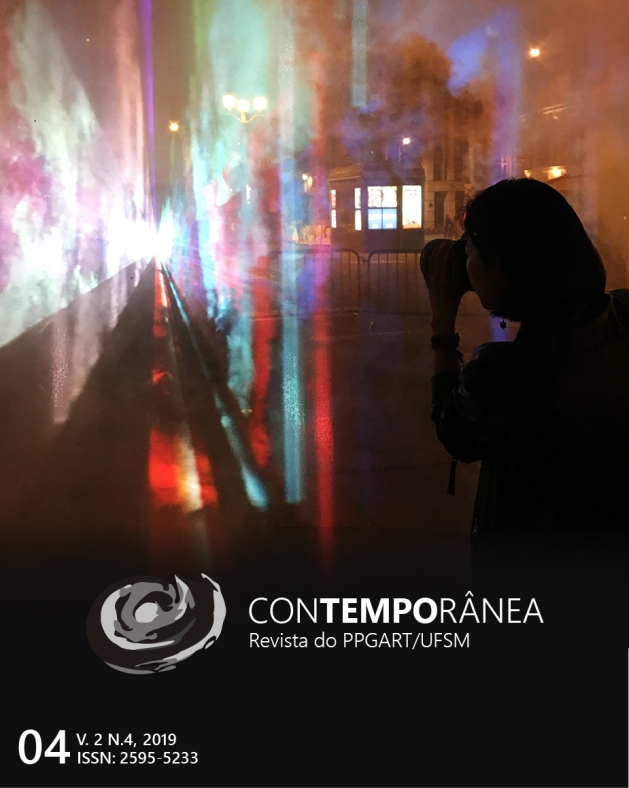Criando jogos que priorizam o significado em detrimento da diversão
DOI:
https://doi.org/10.5902/2595523341302Palavras-chave:
Fricção estética, Design de jogos, Círculo vicioso hedónico, Interação, Construção de significadoResumo
A maioria do design de jogos contemporâneo está focada no desenvolvimento de um círculo vicioso hedónico, uma estética sem fricção que depende de familiaridade e conforto para promover estados de fluxo e satisfação. Sem desconsiderar as vantagens de desenhar para o círculo vicioso hedónico, este artigo questiona-o e desenvolve uma crítica que advoga por um foco na fricção estética, uma mudança na experiência de jogar que dá prioridade à construção de significado em detrimento da diversão.Downloads
Referências
AARSETH, E. J. Cybertext, Perspectives on Ergodic Literature. Baltimore, MD: The Johns Hopkins University Press, 1997.
ADAMS, Ernest. Resolutions to Some Problems in Interactive Storytelling. 2013. Tese PhD, University of Teesside, Inglaterra. Accessed on: 23 Nov. 2019, at: http://www.designersnotebook.com.
ANTHROPY, Anna. Rise of the videogame zinesters: How freaks, normals, amateurs, artists, dreamers, dropouts, queers, housewives, and people like you are taking back an art form. New York, NY: Seven Stories Press, 2012.
COSTIKYAN, Greg. Uncertainty in Games. Cambridge, MA: The MIT Press, 2013.
CSÍKSZENTMIHÁLYI, Mihaly. Flow: The Psychology of Optimal Experience. New York, NY: Harper, 1990.
DE WILDT, L. “Enstranging Play: Distinguishing Playful Subjecthood from Governance”. Philosophy of Computer Games Conference, 2014.
DUNNE, Anthony. Hertzian Tales: Electronic Products, Aesthetic Experience, and Critical Design. Cambridge, MA: The MIT Press, 2005.
FLANAGAN, Mary. Critical Play: Radical Game Design. Cambridge, MA: The MIT Press, 2009.
HOLIWELL, S. R. A Maze of Murderscapes: Metroid II. Gamasutra. Available at: https://www.gamasutra.com/blogs/SRHoliwell/20150130/235329/A_Maze_of_ Murderscapes_Metroid_II.php. Accessed on 14 Nov. 2019.
ISBISTER, Katherine. How Games Move Us: Emotion by Design. Cambridge, MA: The MIT Press, 2017.
JØRGENSEN, Kristine, et al. Transgression in Games and Play. Cambridge, MA: The MIT Press, 2018.
KOSTER, Raph. A Theory of Fun for Game Design. Scottsdale, AZ: Paraglyph Press, Inc., 2013.
PÖTZSCH, Holger. “Playing Games with Shklovsky, Brecht, and Boal: Ostranenie, V-Effect, and Spect-Actors as Analytical Tools for Game Studies”. Game Studies, the international journal of computer game research, Vol. 2,
No. 17, Dezembro 2017. ISSN:1604-7982.
RUBERG, Bonnie. “No Fun: The Queer Potential of Video Games that Annoy, Anger, Disappoint, Sadden, and Hurt”. QED: A Journal in GLBTQ Worldmaking, Vol. 2, No. 2, p. 108–124, 2015.
SHARP, John. Works of Game: On the Aesthetics of Games and Art. Cambridge, MA: The MIT Press, 2015.
ZAGAL, José Pablo, BJÖRK, Staffan e LEWIS, Chris. “Dark Patterns in the Design of Games”. In Proceedings of the 8th International Conference on the Foundations of Digital Games. Chania, Crete, Greece: Society for the
Advancement of the Science of Digital Games, p. 39-46, 2013.
Downloads
Publicado
Como Citar
Edição
Seção
Licença
Proposta de Política para Periódicos de Acesso Livre
Autores que publicam nesta revista concordam com os seguintes termos:
- Autores mantém os direitos autorais e concedem à revista o direito de primeira publicação, com o trabalho simultaneamente licenciado sob a Licença Creative Commons Attribution que permite o compartilhamento do trabalho com reconhecimento da autoria e publicação inicial nesta revista.
- Autores têm autorização para assumir contratos adicionais separadamente, para distribuição não-exclusiva da versão do trabalho publicada nesta revista (ex.: publicar em repositório institucional ou como capítulo de livro), com reconhecimento de autoria e publicação inicial nesta revista.
- Autores têm permissão e são estimulados a publicar e distribuir seu trabalho online (ex.: em repositórios institucionais ou na sua página pessoal) a qualquer ponto antes ou durante o processo editorial, já que isso pode gerar alterações produtivas, bem como aumentar o impacto e a citação do trabalho publicado (Veja O Efeito do Acesso Livre).







